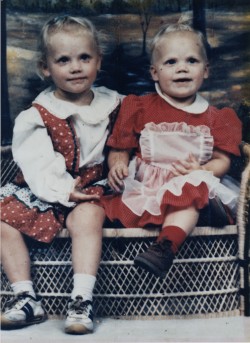Kathy Jo v. DFCS
 At age 5, Kathy Jo Taylor and her 3-year-old sister Jodie were abandoned by their mother and left in the care of their biological grandmother in a neighborhood where four of their uncles also lived. The girls were well cared for, but their grandmother became worried about their legal status because their parents were absent from their upbringing. Kathy Jo’s grandmother called DFCS because she thought it was her responsibility to tell the state that she was raising her daughter’s children and shortly thereafter, the state removed the girls from their grandmother’s home.
At age 5, Kathy Jo Taylor and her 3-year-old sister Jodie were abandoned by their mother and left in the care of their biological grandmother in a neighborhood where four of their uncles also lived. The girls were well cared for, but their grandmother became worried about their legal status because their parents were absent from their upbringing. Kathy Jo’s grandmother called DFCS because she thought it was her responsibility to tell the state that she was raising her daughter’s children and shortly thereafter, the state removed the girls from their grandmother’s home.
During the next six months, Kathy Jo and her sister had been moved to five different foster homes. At age 9, Kathy Jo was beaten into a coma by a foster parent. She remained on life support until she was 21 years old, when she died.
At the time her lawsuit was filed, the courts did not recognize the constitutional rights of children. The case was originally thrown out at both the trial court and the first federal level of appeals until one judge saw the potential ramifications of this landmark case. Kathy Jo’s case then went to the full Eleventh Circuit Court of Appeals where it was decided that children in state custody have constitutional due process of rights.
The State of Georgia appealed this decision to the US Supreme Court contending that children were like ‘chattel,’ similar to farm equipment and animals, and were to be controlled by adults. Right before oral arguments, Kathy Jo’s case was joined with the DeShanney case, a Wisconsin child abuse case where the state never took custody of the child despite visual evidence of severe and repeated abuse. Like Kathy Jo, DeShanney suffered horrible injustices documented by child services and home visitors that included, but were not limited to, cigarette burns, cuts and bruises.
The US Supreme Court gave Kathy Jo her justice and ensured that from that day forward, every child in foster care, group homes, emergency shelters or any other form of state custody has constitutional rights. Sadly, however, the court determined that children not in state custody have no constitutional rights and their abuse has no remedy in the court system. Since 1990, both Kathy Jo’s case and the DeShanney case are included in every constitutional law book used in law schools throughout the United States.
While tragic, the Kathy Jo Taylor led to one of the biggest reforms of Georgia’s Foster Care System (DFCS) in history. Kathy Jo’s case resulted in a federal consent order which requires four things of Georgia’s DFCS : 1) Caseworkers have to exhaust every possibility of placing a child with a blood-relative. 2) Foster parents cannot use corporal punishment. 3) Caseworkers have to have monthly face-to-face meetings with foster children. 4) Upon charges of abuse being filed, DFCS workers have to appear in juvenile court with the child and justify the agency’s actions relative to the abuse.
Those provisions were made law by the Georgia State Legislature in 1989. The “Kathy Jo Law” has now been adopted almost verbatim in 47 states.
The Keenan Kids Foundation was founded largely due to the Kathy Jo Taylor case and the need for at-risk children like Kathy Jo to have protection under law. Dennis Collins, Kathy Jo’s uncle and representative through her treatment and litigation, was integral in establishing the Keenan’s Kids Foundation in 1993 and remains on the Board of Directors to this day.
